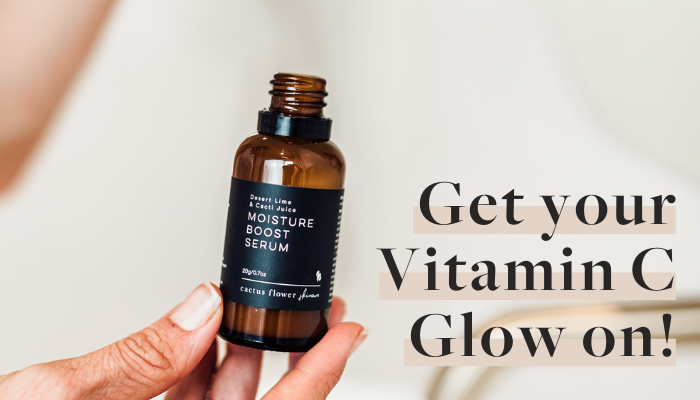
Your Verified Guide to getting your Glow-on with Vitamin C
Share
What does Vitamin C do for your skin?
Vitamin C is a nutrient & antioxidant that our skin REQUIRES to be able to form / create collagen. Normally found in citrus based fruits, we can eat it & apply it topically to give our skin a restorative boost.
Types of Vitamin C: Natural vs. Synthetic
Natural Vitamin C
Is extracted from plants & contains not just Vitamin C, but a naturally occurring profile of other phytonutrients from the plant source. These complementary nutrients like bioflavonoids and beta-carotene assist absorption into the skin.
Synthetic Vitamin C
Are made in a lab, usually from ingredients such as corn syrup & acetone. They don’t contain naturally occurring complementary phytonutrients but are often paired with other synthetic ingredients to promote absorption into the skin.
Synthetics you will often see used in products.
- Ascorbic acid
- L-ascorbic acid (generally accepted to be the most stable & effective)
- Magnesium ascorbyl phosphate
- Ascorbyl palmitate
- Ascorbic acid polypeptide
- Ascorbyl glucosamine
- Ascorbyl glucoside
- Ester-C
- Sodium ascorbyl palmitate
- Sodium ascorbyl phosphate
Both types of vitamin C are basically identical at the molecular level and there are many synthetic formulas out there that provide good benefits for the skin, so we don’t want to say that synthetic vitamin C is bad as it isn’t necessarily. Different products will work better on different skin & in the right formulas, it can be very good for skin.
We firmly believe however that there are some key differences that support our preference for only using natural Vitamin C including:
- Natural C just contains MORE: it contains bioflavonoids, antioxidants & enzymes which help the skin actually use & absorb Vitamin C. This brightens the skin, boosts collagen production, evens tone and helps protect the skin barrier from damage.
- The pH balance: natural Vitamin C has a pH balance of 6 to pH neutral (which is ideal for skin) whereas ascorbic acid has a pH balance of 1 – 2.5 which unless combined with other ingredients, can be irritating for the skin.
- Plant-based C does not oxidise: when Vitamin C oxidises (is exposed to air) it loses its effect / value which means it may not ever make it into your skin. Natural Vit C is encapsulated within the plant cell walls & remains stable when you remove it from the skincare bottle.
- Protects from UV damage: that’s not to say it’s a sunscreen – this would be misleading, but natural C contains high level of antioxidants that work to protect the skin from damage as opposed to trigger UV sensitivity.
What Vitamin C do we use?
Our Moisture Boost Serum is your go-to focused source of Vitamin C in our products (it is in quite a few other products, but not in concentrations as high).
To achieve that Vitamin C induced glow we’re all looking for, we’ve incorporated in the new formulation 2x Australian botanical powerhouses:
- Kakadu Plum
- Desert Lime
Kakadu Plum (also known as gubinge, billygoat plum, or murunga).
Kakadu Plum is the world’s richest source of natural Vitamin C & has been used by the Aboriginal People in skincare & remedies for 1000’s of years. It’s benefits include:
- Kakadu plum contains 3700mg per 100g, which is about 70 times more vitamin C than oranges!
- Promotes collagen production to keep skin looking plump & helps improve elasticity reducing fine lines & wrinkles.
- Brightens skin, helps to fade pigmentation & even skin tone.
- Contains other important antioxidants that help absorption & defend the skin against free radicals (such as gallic & ellagic acids). These two antioxidants are also great skin soothers which make Kakadu Plum suitable for sensitive skin.
Desert Lime (also known as bush lime, native cumquat & wild lime).
- Not quite as high in Vitamin C as Kakadu Plum, but still considerably higher than most other ingredients.
- Is a major source of limnocitrin and other methoxy flavone glycosides. Our body uses glycosides heal and repair damage to the skin. They also keep skin hydrated and elastic, while increasing the intake of other nutrients.
- Contains Coumarin which is an antifungal, anti-inflammatory & protects the skin from UV damage.
- Contains furanocoumarin which increases the rate of skin regeneration & wound healing & can prevent premature ageing.
How to Start using Vitamin C
Even natural Vitamin C is an active ingredient, so the best advice we can give you is to start slow. Whilst our Moisture Boost Serum is super sensitive skin friendly (& contains Colloidal Oats for extra soothing), work it into your routine a couple of days/week to see how your skin tolerates it and build up to daily from there.
If you’re using a synthetic C, start 1-2 days/week and go from there. If you’re using a synthetic C, don’t use glycolic, salicylic or lactic acids on the same night as they may mess with the Vitamin Cs pH balance and render it useless.
How we Layer our Moisture Boost Serum with other products?
The Moisture Boost Serum is super versatile & can be used by all skin types.
For oilier type skins, you could use this on its own as a morning moisturise (it sits beautifully under makeup FYI) & for normal to dry types, you can easily & safely layer this with other products. Our order would be:
- Moisture Boost Serum
- Usual Moisturiser
- Facial Oil
